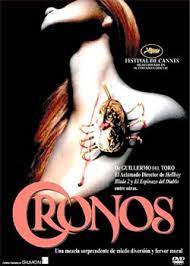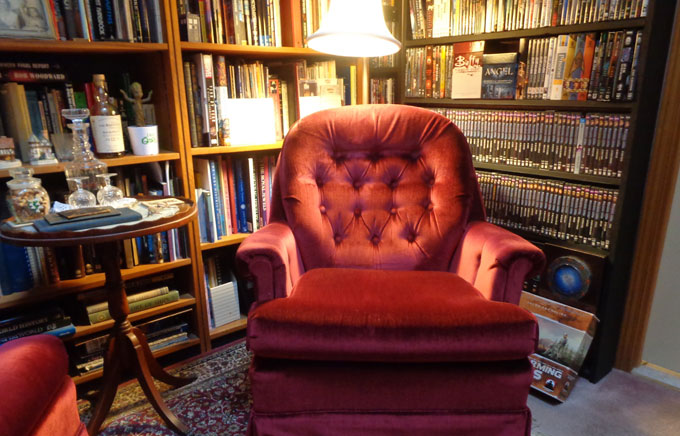
In 1536, an alchemist (Mario Ivan Martinez) in Veracruz, Mexico, develops a mechanism that can bestow universal life. In 1937, an old building collapses and the alchemist, still alive, his skin marble-white, is killed when his heart is pierced by the debris. Investigators discover basins filled with blood from a corpse but keep the find secret.
In 1996, an aged antique dealer, Jesus Gris (Federico Luppi) notices that the base of an archangel statue is hollow. Inside, he finds an ancient scarab-like device—450 years old. He winds it like a clock and it grabs him with spider-like legs and stabs him with a needle. He is injected with an unidentified solution by an insect inside. He finds his health and vigor returning and seems to be getting younger. His wrinkles disappear, his hair grows thicker and his sexual appetite increases. He begins to thirst for blood. He uses the device again but says his prayers as he does so. His granddaughter Aurora (Tamara Shannath) worries about him.
A rich businessman, Dieter de la Guardia (Claudio Brook), who is dying, learns about the statue and the device within. He sends his young thug of a nephew Angel (Ron Perlman) to purchase the statue at the antique shop, and when the device is not found, to break in and search the place. During a New Years party, Gris sees a man bleeding from the nose and follows him into the men’s room, hoping to get some of the blood. Gris notices some on the floor and licks it up, but Angel finds him and kicks him unconscious.
In his car, Angel gives him alcohol and tries to beat him into giving up the device. Angel places him unconscious in the car and pushes it off a cliff. Gris dies and arises again at the undertaker’s and escapes before he can be cremated. Dieter beats Angel for not ensuring that Gris’s heart was destroyed and sends him to check on the body. He is told that Gris was cremated and is satisfied. Gris writes a letter to his wife and says he will return to her when his project is done. His skin burns in sunlight and he sleeps in a box to avoid it.
He and Aurora bring the device to Dieter’s headquarters. Dieter tells him to peel off his skin and he will find a new marble-white skin underneath. He is told that he will die if he destroys the device, but Dieter offers him a way out. Gris takes the offer. Dieter takes the device and stabs him. Aurora aids Gris, who feeds on Dieter. Seeing Dieter so vulnerable, Angel stabs Dieter and crushes his throat, tired of waiting for his inheritance. Then he beats Gris on the roof. But Gris grabs him and leaps off the roof with him. Angel dies. Aurora finds Gris unconscious and uses the device to wake him. She is hurt and finding himself tempted to drink Aurora’s blood, he destroys the device. He does not die. He goes home with his family and waits to see if he will die in their arms.
This was the first film directed by Guillermo del Toro and the first of many by him to feature Ron Perlman. It was the Mexican offer for Best Foreign Film at the Oscars but was not chosen as a nominee. But critics praised its acting, originality, mythology, religious references, and mixture of horror and drama. It is now recognized as one of the great horror films. Ron Perlman tried to speak Spanish but was so laughably bad at it that his character was changed from a Mexican to an angry American. When del Toro ran out of money to finish the film, Perlman offered to take a pay-cut and they have been friends ever since.
All the Cronos devices made for the film were stolen. The Alchemist was named Fulconelli and really lived in the 19th Century. He mysteriously disappeared in the 1940s and no sign of him has ever been discovered. When Universal Studios tried to purchase the story for a re-make, del Toro said, “Who would want to see Jack Lemmon lick blood off a bathroom floor?” The actor in mind for the lead was originally Max Von Sydow. Like Hitchcock, del Toro is seen on screen with his wife and his dog in the street. Aurora (Tamara Shannath), who is supposed to be autistic, says only one word in the movie—Abuelo, which means grandfather.
